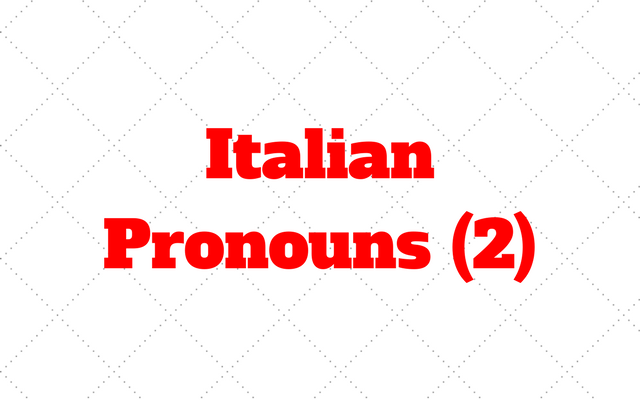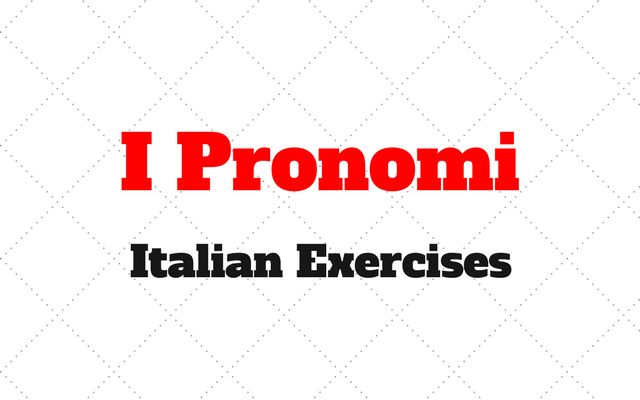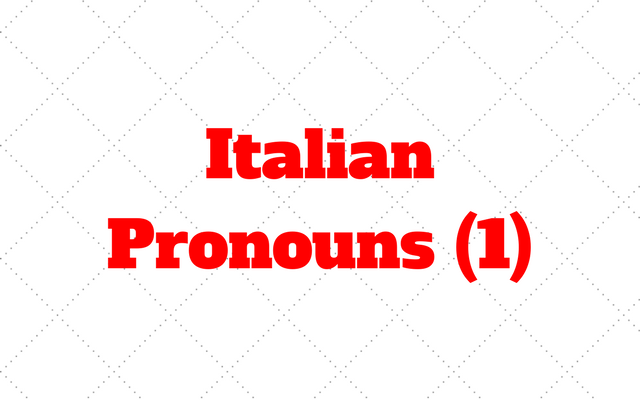
I pronomi possessivi
| English | Mine | Yours | His | Hers | Ours | Yours | Theirs |
| Italian | Mio | Tuo | Suo | Suo | Nostro | Vostro | Loro |
In Italian, Possessive Pronouns and Adjective Pronouns have the same form. Both categories express ownership and relationship.
Let’s look at some examples:
– Io mio cane è nero, di che colore è il tuo?
– “Mio” is the adjective, while “Tuo” is the pronoun.
– Il nostro albero di ciliegio è in fiore, e il vostro?
– Il libro di Silvia è sul tavolo, dov’è il tuo?
– Questi sono i miei occhiali o i tuoi?
– I nostri alunni sono più tranquilli dei vostri.
I pronomi dimostrativi
I pronomi dimostrativi help us indicate position in space and time. In Italian Demonstrative adjective and pronouns have the same form: the first ones accompany nouns; the second ones substitute them.
Here are the demonstrative pronouns divided by gender and number:
| Singular | English Sing. | Plural | English Plur. | |
| Masculine | Questo | This | Questi | These |
| Feminine | Questa | This | Queste | These |
| Masculine | Quello | That | Quelli | Those |
| Feminie | Quella | That | Quelle | Those |
Let’s look at some examples:
– Il mio banco è questo; il tuo è quello!
– Questa stanza è occupata, prendi quella!
– Sono tue queste? (while indicating something)
– Quelle scarpe sono grandi, perché non provi queste?
I pronomi indefiniti
Indefinite pronouns, as adjectives pronouns, are used to describe people, places and things without being specific. They give an idea of the things they’re describing. Some of them are both adjectives and pronouns, depending on their role in the sentence:
| alcuno: any | certo: some | nessuno: nobody |
| alquanto: somewhat | ciascuno: each (person) | parecchio: a lot |
| altrettanto: as much | diverso: much | poco: little |
| altro: other | molto: a lot | tale: as much |
| taluno: some (people) | tanto: a lot | troppo: too much |
| tutto: all | vario: several |
Here are some examples:
– Alcuni amici vanno in campagna sabato, altri rimangono a casa.
– “Quante volte sei stato in Francia?” “Parecchie”
– Troppi non trovano lavoro.
Some of them are only pronouns:
| alcunché: nothing | niente: nothing | ognuno: everyone |
| chiunque: whoever | nulla: nothing | qualcosa: something |
| qualcuno: someone | uno: a |
– Qualcuno ci ha parlato di Franco.
– Chiunque abbia voglia di venire a trovarci è benvenuto!
– Niente è stato ancora deciso.
I pronomi relativi
Relative pronouns are small words used to connect sentences, which have something in common. Let’s read the example:
– Ho letto un libro. Il libro era noioso.
– Il libro, che ho letto, era noioso.
In order to avoid repetition and to make conversation/writing more fluent, we use relative pronouns!
Here is a list of relative pronouns:
Che (invariable) → Il film, che ho visto, mi è piaciuto tanto.
Cui (invariable) → La ragazza, di cui ti parlavo, stasera verrà alla festa.
Il quale, la quale, i quali, le quali (change according to gender and number)
– Ho parlato con la maestra, la quale mi ha confermato lo sciopero.
– Ho rincontrato una persona, della quale non avevo più notizie.
I pronomi interrogativi
We use interrogative pronouns to create questions:
Chi? (Who, whom?) → Chi è venuto con te?
Che/ Che cosa/ Cosa? (What?) → Che cosa stai dicendo?
Quale? (Which, which one?) → Quale vuoi comprare?
Sometimes prepositions as a, di, con, and per can precede the interrogative pronoun to create different questions:
Con chi vai al cinema?→ Who are you going to the movies with?
A che ti serve?→ What do you need it for?
Di chi è questo maglione?→Whose is this cardigan?
Italian pronouns: Drill and practice ◄◄






